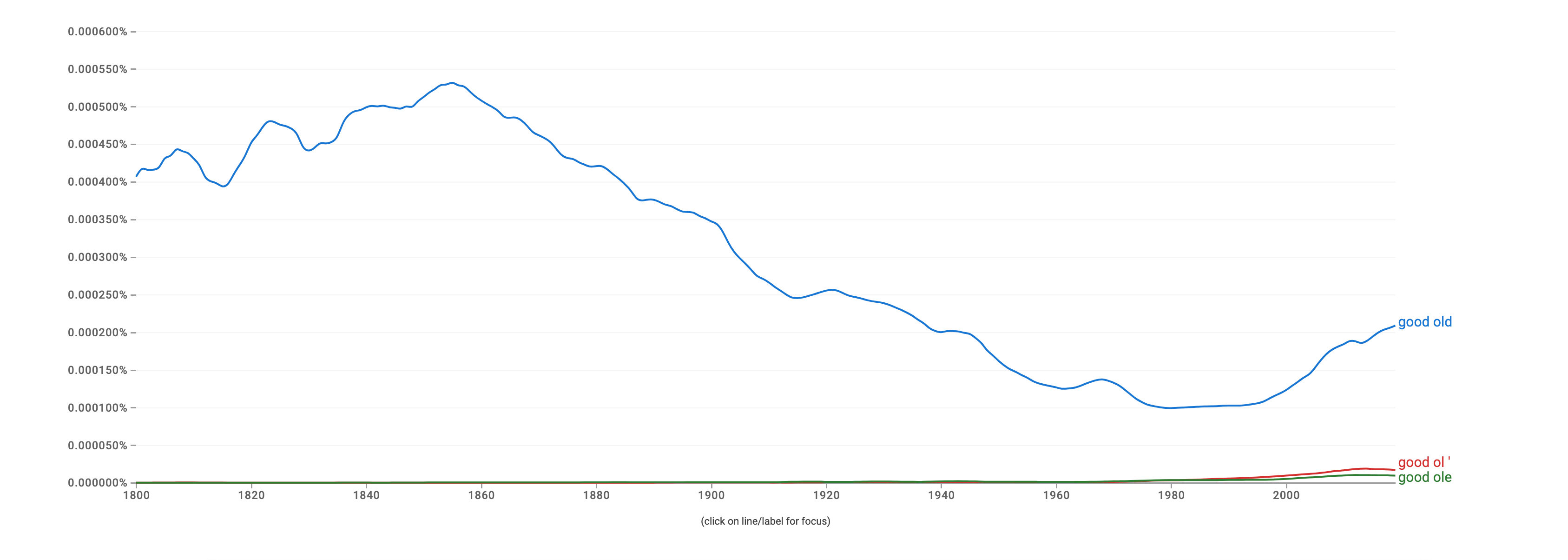The phrase "good old" is a timeless expression used to evoke familiarity and affection. It's often employed when referring to something or someone with a sense of nostalgia or appreciation.
- "Good ol" is a colloquial variation of "good old," bringing an informal and friendly tone to the expression. It's frequently used in casual conversations to convey a sense of comfort and camaraderie.
- "Good ole" is another informal, Southern twist on the "good old." It adds a touch of regional charm and is often used to express fondness for people, places, or things with a hint of nostalgia.


When to use "Good Old"
Expressing nostalgia or fondness
- For a bygone era: "Remembering the good old days when dial-up internet was cutting edge."
- For familiar things: "Nothing beats the good old comfort of a home-cooked meal."
- For reliable people: "Good old Susan, always there to lend a helping hand."
Adding a touch of informality
- "Let's have a good old chat and catch up."
In formal contexts, with a specific meaning
- "The Good Old Days" can be a historical period, like the "Good Old Victorian Era."
When to use Good Old vs. Good Ol' vs. Good Ole
Good Old:
Formality: This is the most formal variation. Use "Good Old" when writing in a more formal context, such as professional emails, academic papers, or official documents.
Examples:
- "I miss the good old days of simplicity."
Good Ol':
Informality: "Good Ol'" is a casual, colloquial variation. It's suitable for everyday conversations, informal writing, or when you want to add a friendly and approachable tone.
Examples:
- "Let's have a chat over some good ol' coffee."
Good Ole':
Regional or Colloquial Flavor: "Good Ole'" adds a touch of regional or colloquial charm. It may be used to create a more informal or Southern vibe.
Examples:
- "We had a great time at the good ole' country fair."

Examples from the web
Good old
"... Now that he had thrashed Donfrey, he felt a surge of affection for him. Good old Donfrey. He and Donfrey were the twin pillars of the local business community. ..." - The New Yorker
Good Ol'
"... operational security (OPSEC), and information security (INFOSEC) threat to the US Army".Good ol' Wikileaks, bringing down the U.S. government. You can read the report [PDF!], and I do believe this qualifies as "irony," on Wikileaks. ..." - TechCrunch
Good Ole
"... Let's see.9.01 Ah, a glitzy little flashback to the good ole days when there used to be eight candidates sharing the stage. Maybe MSNBC's practicing for the Olympics. ..." - The Guardian
"Choose 'Good Old' for formality, 'Good Ol'' for a casual, colloquial tone with the contracted 'Ol',' and 'Good Ole' for a more informal, folksy style with the variant 'Ole.' Tailor your choice to match the desired level of formality or informality in your communication."
Usage of Good Old vs. Good Ol' vs. Good Ole
Examining the graph below, we can see that the term "good old" occurs most frequently, followed by "good ol'," and then "good ole."
The use of "good old" peaked in the 1860s, and had been decreasing until the 1980s, where its occurrence slowly started to increase again.

FAQ
Is it good ol' or ol' good?
It's "good ol'." This informal phrase is a colloquial way of expressing familiarity or affection for something old but cherished. Whether referring to a friend or a tradition, "good ol'" evokes a sense of nostalgia and fondness in just two words.
Is Ole short for old?
No, "Ole" is not short for "old." "Ole" is a given name of Spanish origin, often used as a nickname or informal term of endearment. It is not related to the word "old" in meaning or etymology.
Summary
Mastering the usage of "good old," "good ol'," and "good ole'" is about embracing the informal charm they bring to your language. Whether you're expressing fondness for the past or creating a warm atmosphere in conversation, understanding the subtle differences allows you to wield these idioms with precision and flair. So, go ahead, sprinkle a bit of nostalgia into your language and make those memories feel "good old" in the best possible way!

Want to sound like a native speaker?
Engram’s AI-powered grammar checker makes your English sound like a native speaker’s, suggesting natural English expressions on top of fixing grammar, spelling, punctuation, word order, and vocabulary.

References:















